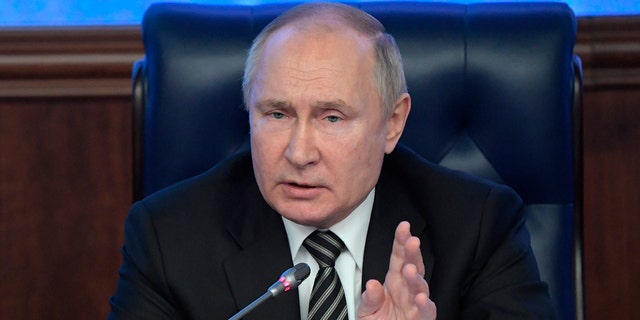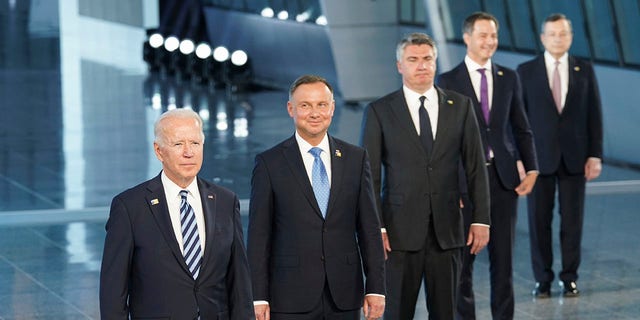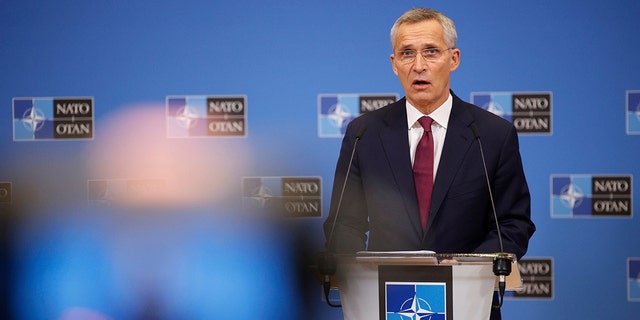Russia’s military buildup along its border with Ukraine and the hostile rhetoric coming out of Moscow is making some of its regional neighbor’s rethink long-held post-World War II security arrangements.
Recent pronouncements coming from Finland and Sweden suggest the two countries are now more open to joining the North Atlantic Treaty Organization (NATO) and will not back down in the face of threats from Russian President Vladimir Putin.
The likelihood of a Russian invasion of Ukraine is growing daily, and yet the leaders of Finland and Sweden remain firm in defending their countries’ interests against threats from Moscow. Finnish Prime Minister Sanna Marin affirmed Finland’s right to chart its own security posture.
RUSSIA THREATS, RHETORIC INCREASE CHANCE OF CONFLICT AS IT SEEKS NATO ASSURANCES
In her New Year’s Eve speech to the nation, Prime Minister Marin declared “We retain the option of applying for NATO membership. We should uphold this freedom of choice and make sure it remains a reality, as this is part of every country’s right to decide on its own security policies.” Finland’s president, Sauli Niinisto, reinforced the prime minister’s sentiments in his own New Year’s Eve speech, saying “let it be stated once again: Finland’s room to maneuver and freedom of choice also include the possibility of military alignment and of applying for NATO membership, should we ourselves so decide.”
Sweden’s Minister of Foreign Affairs Anne Linde also asserted that Russia does not have a veto on whatever alliance Sweden chooses to join. Defense Minister Peter Hultqvist backed up Linde and dismissed the notion that Russia has any say in Sweden’s security policies.

Russian President Vladimir Putin gestures while speaking at an extended meeting of the Russian Defense Ministry Board at the National Defense Control Center in Moscow, Russia, Dec. 21, 2021.
(Sergey Guneyev, Sputnik, Kremlin Pool Photo via AP, File)
The possibility of Finland, a country with a history of not joining any military alliance, in Russia’s backyard joining NATO clearly rattled Moscow, with the foreign ministry stating the possibility of Finland and Sweden joining NATO “would have serious military and political consequences that would require an adequate response from the Russian side.” Given the historical and political differences in relations with Russia, calls for possible NATO membership are currently greater in Finland than they are in Sweden.
The signals emanating from Finland on possible NATO membership would be an unprecedented break from Helsinki’s post-World War II international security policy that formed the bedrock of its Cold War foreign policy. Finland’s neutrality after World War II was due to its precarious and unique geographic position as essentially a buffer between the communist East and democratic West in Europe. Finland shares a long border with Russia and was subjected to invasion and occupation during the Winter War of 1939-1940.
Realizing its difficult strategic position between East and West and coming off the devastation of Soviet occupation, Finland pursued a policy of neutrality and did not join NATO or any other military alliance during the Cold War. A Friendship Treaty was imposed on Finland in 1948 and the terms of the agreement were defined by the Soviet Union. The underlying agreement meant Finland accepted a certain level of Soviet influence over its international orientation, limiting its relations with the west and committing it to collective defense with the Soviet Union.
THINGS ARE GETTING EDGY HERE IN UKRAINE. AND COLD.
Finland’s acquiescence to Russian security concerns is precisely the guarantees Putin is looking for in its relations with Ukraine. Ukraine, which also borders Russia and had chunks of its territory annexed and occupied by Russian forces in 2014, has the long-term goal of joining NATO in the hopes of staving off future Russian aggression.
If Finland were to join the Atlantic Alliance, it would bring yet another western-aligned country adjacent to Russia’s border, violating Russia’s core post-Cold War principle that NATO would refrain from moving eastward and toward Russia. It’s this misunderstood notion that is at the crux of the modern conflict with Ukraine and other countries that seek NATO protection. When Germany reunified in 1990 and the Soviet Union was on the cusp of collapse, the Soviets were looking for assurances from the United States that former Warsaw Pact countries would not join NATO. President Putin claims the U.S. violated its pledge as NATO began a steady stream of enlargement, starting with Hungary, Poland, and the Czech Republic in 1999. Further NATO membership was extended in 2004 when Bulgaria, Romania, Slovakia, Slovenia, Latvia, Lithuania, and Estonia were admitted. At the 2008 Bucharest Summit, the alliance agreed that membership would be extended to Georgia and Ukraine.

President Joe Biden and other NATO heads of the states and governments pose for a family photo during the NATO summit at the Alliance’s headquarters, in Brussels, Belgium, Monday, June 14, 2021.
(Kevin Lamarque/Pool via AP)
The post-Cold War rounds of enlargement took place under conditions of unquestioned U.S. primacy and relative Russian economic weakness and international decline. Since Russia’s 2008 invasion of Georgia and the annexation of Crimea and occupation of the Donbas region of Ukraine in 2014, Russia has reasserted itself on the international stage and Putin has once again made clear to the west that Russia won’t tolerate NATO eastward expansion.
Alexander Stubb, who served as Prime Minister, Foreign Minister, and Finance Minister from 2008 to 2016 and now serves as Director of the School of Transitional Governance at the European University Institute, said that Finland should have joined NATO in 1995. “My personal opinion is that Finland should have joined in 1995, at the same time when we joined the E.U. My opinion has not changed. Now, it is more a question of timing. Finland’s military system is more NATO compatible than those of some NATO members. Negotiations are never a walk in the park, but in the case of Finland the membership track would be fast,” former Prime Minister Stubbs told Fox News.
Finland also deepened its cooperation with NATO during that period without becoming a formal member.
In 1994, Finland joined NATO’s Partnership for Peace program to enhance cooperation and dialogue between NATO and non-NATO member states. Finland also conducted regular exercises with NATO forces and was an active contributor to many NATO-led missions, including missions in Iraq and Afghanistan.
If Finland were to formally take the leap and join NATO, it would involve both benefits and costs for the country.
“What Finland would see as the most important benefit is the collective safety guarantee of NATO that the European Union, in its present form, does not militarily provide,” Laura Nordstrom, doctoral researcher at the University of Helsinki, told Fox News. With a revanchist and resurgent Russia threatening its neighbors, collective security guarantees from NATO would lower the threat perception posed by Russia.
The obvious costs for Finland would be worsening relations with Russia at a time when Moscow’s relations with the west are already frayed and at their worst point since the dark days of the Cold War. Such a move would cross Putin’s demands that NATO halt any further eastward expansion. From the alliance’s perspective, full NATO membership entails Finland enjoying the right to Article 5 collective self-defense, if Russia were to attack Finland, the alliance would be forced to respond and defend Finland.

NATO Secretary General Jens Stoltenberg speaks to the press ahead of a meeting of NATO Foreign Affairs Ministers to be held on Nov. 30-Dec.1, at the NATO headquarters, in Brussels, Belgium, Friday, Nov. 26, 2021.
(AP Photo/Olivier Matthys))
Former Prime Minister Stubbs said Russia’s recent hostility and blatant violation of international law and norms brings NATO’s mission back to its original Cold War mandate.
“It was created as a deterrent to the Soviet Union. Won the Cold War without firing a shot. Then had to do some soul-searching through crisis management. And now, with Russian aggression, has come back full circle to its origins. Hardly what the Kremlin had in mind,” Prime Minister Stubbs told Fox News.
With that in mind, it’s not entirely assured that Finland joining NATO would pose as severe a threat to Russia as Ukraine or Georgia joining the alliance. “Finland’s membership, already an E.U. member state and not an ex-Soviet country, would be seen less a problem for Russia. At least Russia has not indicated publicly that Finland would be an equal threat. But this is in the heart of the fears of the Finnish debate on the membership,” Nordstrom said. Unlike Ukraine and Georgia, Finland was never incorporated into the Soviet Union and enjoys full membership in most Western institutions.
Some in the foreign policy and international security world believe NATO expansion, including Finland becoming a member state, is needlessly provocative at a moment when any escalatory move could lead to armed conflict.
“NATO was created to counter the now defunct Soviet Union. A condition for ending the Cold War was for NATO to desist gobbling up countries in Russia’s sphere of influence. Hawks want to pretend that Russia is not genuinely concerned by NATO expansion, but this is not a serious argument,” Max Abrahms, international security expert at Northeastern University, told Fox News. While NATO expansion may be viewed by the west as purely defensive and in response to Putin’s latest machinations, Russia views it as an offensive maneuver that will challenge Moscow’s place in the world.
CLICK HERE TO GET THE FOX NEWS APP
Although support for joining NATO has increased slightly over the years, public opinion polling shows Finns remain opposed to joining the Atlantic Alliance, with 28 percent in favor and 42 percent in opposition. The fact remains that NATO membership for either Finland or Sweden remains a distant endeavor, but much could change in the coming months depending on Putin’s whims and whether he decides to move in on Ukraine.